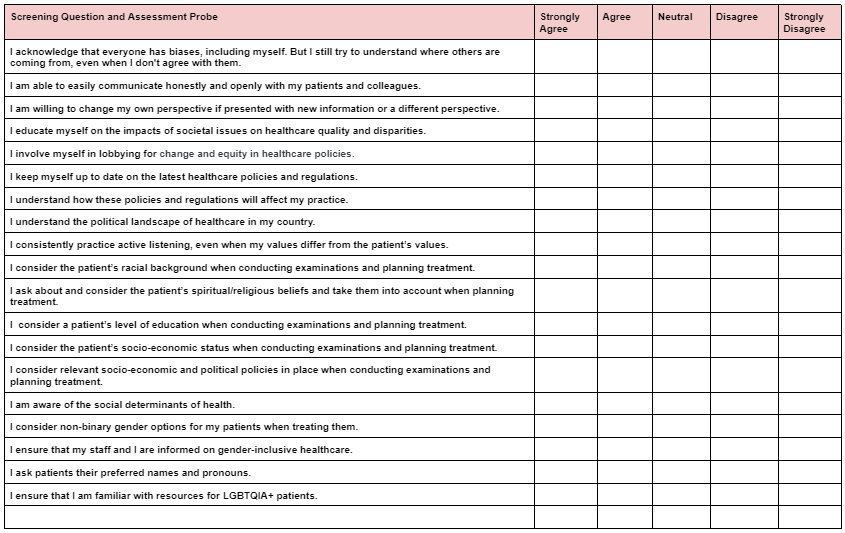-
GeneralGeneral
-
Homepage


This course, Dismantling Structural Racism to Advance Health Equity, provides an introductory exploration of the key concepts related to health equity, including structural racism, health inequities, and social determinants of health. Participants will develop a practice of self-reflection and learn how structurally racist policies have adversely impacted health. They will also identify strategies to begin dismantling these policies in healthcare organizations and develop an action plan to implement these strategies.
This course emphasizes practical applications and solutions and provides participants with the knowledge and resources to make a positive impact and promote health equity in their own communities and beyond. It is ideal for healthcare executives and may also be useful to healthcare professionals, policymakers, community leaders, and health professional students who are passionate about advancing health equity and dismantling structural racism. Enroll now to make a difference and join a community of change-makers.
The course was designed by Gold Course Directors, Ruth S. Shim, MD, MPH, and Karinn Glover, MD, MPH, in collaboration with the NextGenU.org team, including Pablo Baldiviezo, M.D, M.Sc., DiplEd.; Sherian Bachan, M.Sc., B.Sc.; Reisha Narine, M.Sc., B.Sc.; and Anthony Schlaff, M.D, MPH. and sponsored by, The Arnold P. Gold Foundation.
Ruth Shim, MD, MPH, is the Luke & Grace Kim Professor in Cultural Psychiatry, Professor of Clinical Psychiatry in the Department of Psychiatry and Behavioral Sciences at the University of California, Davis, and Associate Dean of Diverse and Inclusive Education at the UC Davis School of Medicine. Dr. Shim is a member of the Board of Trustees of the Robert Wood Johnson Foundation and serves on the Editorial Boards of Psychiatric Services, JAMA Psychiatry, Community Mental Health Journal, and American Psychiatric Publishing, and is co-editor of the books, The Social Determinants of Mental Health, and Social (In)Justice and Mental Health. She is an expert on mental health equity, structural racism in medicine, and diversity, equity, and inclusion in academic medicine.
After graduating from Howard University with a BA in History, Karinn Glover, MD, MPH worked at Essence Magazine and as an Account Executive for Verizon. She followed her curiosity about medicine and ultimately attended SUNY Downstate College of Medicine and obtained an MPH from Columbia University's Mailman School of Public Health. Currently Assistant Professor of Psychiatry at the Albert Einstein College of Medicine, Dr. Glover teaches psychopharmacology and psychotherapy to Psychiatry and Family Medicine residents. Her career as a consultant and educator has informed her expertise in the fields of health equity, workplace mental health, and organizational success.
For publications on NextGenU.org’s courses’ efficacy, see NextGenU.org’s publication page. Subscribe to our newsletter to be notified of future updates and new courses and to be part of our community.
There are three (3) modules to complete, which include:
- Module 1: Introduction to Structural Racism and Health Equity
- Module 2: Structural Racism in Health Care and the United States
- Module 3: Dismantling Structural Racism in Health Care Settings
The course requires the completion of all activities. After you’ve completed each module’s learning activity, you will have access to a final exam with multiple-choice questions and a chance to evaluate this course. You will have up to three opportunities to take the final exam and achieve the required score of >=70%.
Once you have passed that last test, you will be able to download a Certificate of Completion from NextGenU.org and our course’s co-sponsoring organizations. We keep all of your personal information confidential, never sell any of your information, and only use anonymized data for research purposes. We are also happy to report your testing information and share your work with anyone (your school, employer, etc.) at your request. We hope you will find this a rewarding learning experience, and we count on your feedback to help us improve this training for future students.
Time estimation for the course:
The completion time for this course is estimated at 18 hours at an average rate of 144 words/minute, comprising 5 hours of learning resources, 8 hours to study the content and assimilation, and 5 hours of participating in learning activities and quizzes, to assist the learners in the synthesis of learning materials.
Engaging with this course:
You may browse this course for free to learn for personal enrichment; there are no requirements. This free course is primarily intended for healthcare executives.
To obtain a certificate, a learner must first register for the course and then successfully complete:
- Complete all the reading requirements;
- Complete all activities and associated certification quizzes;
- Successfully complete the final exam with a minimum of 70% and a maximum of 3 attempts; and
- Complete the self and course evaluation forms.
To obtain credit:
- Complete all requirements listed above for the certificate; and
- Your learning institution or workplace should approve the partner-university-sponsored NextGenU.org course for educational credit, as they would for their learner taking a course anywhere.
NextGenU.org is happy to provide your institution with:
- A link to and description of the course training, so they can see all its components, including the co-sponsoring universities and other professional organization co-sponsors;
- Your grade on the final exam;
- Your work products (e.g., peer and mentored activities) and any other required or optional shared materials that you produce and authorize to share with them;
- Your evaluations - course, self, peer, and mentor assessments; and
- A copy of your certificate of completion, with the co-sponsoring universities and other organizations listed.
To obtain a degree, NextGenU.org co-sponsors degree programs with institutional partners. To obtain a full degree co-sponsored with NextGenU.org, registrants must be enrolled in a degree program as a student of a NextGenU.org institutional partner. If you think that your institution might be interested in offering a degree with NextGenU.org, contact us.
We hope that you will find this a rewarding learning experience, and we count on your assessment and feedback to help us improve this training for future students.
Next steps:
- Complete the registration form; and
- Begin the course with Module 1: Introduction to Structural Racism and Health Equity. In each lesson, read the description, complete all required readings and any required activity, and take the corresponding quizzes.
-
Module 1: Introduction to Structural Racism and Health Equity
 Competencies covered in this module:
Competencies covered in this module:
- Discuss how social inequities, oppression, and structural racism impact health and impede progress toward achieving health equity at organizational, community, and societal levels.
- Develop a practice of humility, self-reflection, and dialogue in regards to structural racism and its impact on health outcomes.
-
Module 1: Lesson 1: Key Concepts and Definitions; Framing the Issue
Student Learning Outcomes:
Upon completion of this lesson, you will be able to:
- Discuss key concepts such as health equity, oppression, structural racism, and social determinants of health.
- Exemplify health inequities due to racist actions/policies that affect health at levels of the socioecological model.
Click here to start this lesson6 URLs, 1 Forum -
Module 1: Lesson 2: Creating a Preparation Plan and Practicing Self-Reflection and Dialogue
Student Learning Outcomes:
Upon completion of this lesson, you will be able to:
- Define the concepts of cultural humility and competence, self-reflection, and dialogue in the context of racism.
- Describe recommendations to develop self-reflection skills and cultural humility.
- Demonstrate structural and cultural humility by practicing self-reflection and dialogue regarding structural racism.
Click here to start this lesson4 URLs, 1 Forum -
Module 2: Structural Racism in Health Care and the United States
 Competency covered in this module:
Competency covered in this module:
- Discuss how social inequities, oppression, and structural racism impact health and impede progress toward achieving health equity at organizational, community, and societal levels.
-
Module 2: Lesson 1: The Historical Context of Structural Racism in the United States
Student Learning Outcomes:
Upon completion of this lesson, you will be able to:
- Describe the concept of structural racism.
- Explain the historical context of structural racism by considering three examples of structurally racist health policies.
- Summarize how historical facts on race have accumulated to create and maintain structural racism observed in the present.
Click here to start this lesson2 URLs -
Module 2: Lesson 2: Current Issues on Structural Racism and Health Care
Student Learning Outcomes:
Upon completion of this lesson, you will be able to:
- Identify current examples of structurally racist policies and their impact on healthcare.
- Discuss how structurally racist policies impact modern healthcare.
Click here to start this lesson2 URLs, 1 Forum -
Module 3: Dismantling Structural Racism in Health Care Settings
 Competency covered in this module:
Competency covered in this module:
- Create a sustainable action plan to dismantle structurally racist policies in healthcare organizations.
-
Module 3: Lesson 1: Developing an Action Plan
Student Learning Outcomes:
Upon completion of this lesson, you will be able to:
- Identify strategies to begin dismantling structurally racist policies in healthcare organizations.
- Develop an action plan for dismantling structurally racist policies in your healthcare settings.
Click here to start this lesson2 URLs, 1 Forum -
Module 3: Lesson 2: How to Create Sustainable Change
Student Learning Outcomes:
Upon completion of this lesson, you will be able to:
- Explain the resources needed to create sustainable change on structurally racist policies in your healthcare settings.
Click here to start this lesson3 URLs - Explain the resources needed to create sustainable change on structurally racist policies in your healthcare settings.
-
Course and Self Evaluation & Certificate
 In this section, you can provide feedback about this course to help us make NextGenU.org better. Once evaluations are completed, you will be able to download your certificate of completion.
In this section, you can provide feedback about this course to help us make NextGenU.org better. Once evaluations are completed, you will be able to download your certificate of completion.
Dismantling Structural Racism to Advance Health Equity
Register for this course to access the discussion forums


